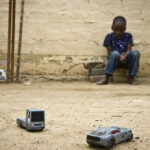The Free State health department has come under fire for a number of reasons. Bhekisisa visited the province ahead of elections to find out more.
The Free State health department is accused of repeatedly running out of HIV medication, intimidating whistle-blowers and appointing a corrupt MEC. Amy Green visited the province to speak to two patients and an activist about their experience of healthcare ahead of elections.
The threatened activist
It was Sunday December 8 2013 and Sello Mkhaliphi was spending some time at his modest home with his wife and three-year-old son in a township outside Bloemfontein in the Free State.
Mkhaliphi, a volunteer for the HIV advocacy organisation, the Treatment Action Campaign (TAC), and, at the time, an employee of the provincial Aids Council at the health department, was playing “cars” with his son, Junior, on the carpeted floor of his living room. Junior giggled as Mkhaliphi made car sounds and pushed the tiny yellow vehicle along his son’s leg.
Mkhaliphi’s cellphone rang and he reached over to pick it up off the armrest of the black couch.
“Mkhaliphi, hello?” he answered.
“Chief,” the anonymous voice said. “What you are doing at TAC you must refrain from doing it.”
“Who is this?” asked Mkhaliphi.
“You just listen because I called you,” the male voice said.
Mkhaliphi put the phone on speaker and set it down on his kitchen table, looking intently at his wife.
The caller continued: “You are bringing bad publicity about the department to the public. You are denting the image of the ruling party when we are heading towards the elections. So as the chairperson [of the Free State branch of TAC] you can rectify this by talking to your comrades. Tell them to withdraw from making these statements.”
Mkhaliphi again asked who the caller was.
“If you fail to do what I’ve just warned you about, you will be dealt with,” said the anonymous voice.
“I don’t take threats very well,” Mkhaliphi warned before the line went dead.
World Aids Day incident
A week before the call, another TAC activist in the province – Machobane Morake – was interrupted during his speech at the health department’s World Aids Day celebrations and escorted off the podium. “Morake was speaking out about things in the province that weren’t working and was taken off the podium by the premier’s [Ace Magashule] bodyguards,” said Mkhaliphi.
At about the same time a damning report was published by the Stop Stock-Outs Project, of which the TAC is a member, stating that antiretroviral (ARV) stock-outs – the term for when supplies of a particular drug have run out completely – have been occurring at more dispensaries and lasting longer in the Free State than in any other province.
In September and October last year more than half of Free State clinics surveyed experienced ARV or TB medication stock-outs.
Mkhaliphi had spoken to local and national media about the report, as well as Morake’s treatment at the World Aids Day event.
“In his speech that day the MEC for health, Benny Malakoane, said that people should not listen to TAC because we spread lies, and there are no shortages of ARVs in the province,” Mkhaliphi said. “In fact, he said: ‘We have 98% coverage of essential medicines.’ ”
Malakoane was arrested in July last year on charges of corruption, relating to crimes allegedly committed while he was the municipal manager at Matjhabeng local municipality in Welkom, from 2007 to 2010.
The case has been postponed to May 16.
The TAC has since launched an election manifesto calling for the suspension of MECs or office bearers facing charges of corruption.
“[P]lan to silence you”
The day after the threatening phone call Mkhaliphi received an SMS telling him to call another member of the Aids Council, urgently.
“I called him and he said to me people at the Free State health department are planning something big and dangerous against me,” he said.
Mkhaliphi was told they were planning to “buy” his former girlfriend to cry rape and file a case against him in court. He was also told that he must not eat anything at his place of work, the provincial Aids Council.
“He said to me: ‘Don’t even drink a cup of water there because there is a plan to silence you through food poisoning,’ ” recounted Mkhaliphi. “The last thing he said [was] ‘Chief, leave the province’. ”
Mkhaliphi went back to the office armed with a home-packed lunch and a bottle of water, worried about what awaited him.
The next day, Tuesday December 10, four men from the office of the MEC arrived with orders to confiscate all their laptops, Mkhaliphi’s included.
“I put in my leave forms with my supervisor and left the province that day and spent the whole of December fleeing for my life, never staying in one place for too long.”
When he returned to work in January he was given a dismissal letter stating he had not properly applied for leave, which ended his work at the provincial Aids Council.
Night vigil
While he fled the province his wife, mother and son remained in his house.
On December 31, TAC activists from the province’s 37 branches gathered at Mkhaliphi’s house in his absence and held a night vigil to “cheer my family up”.
“Comrades were chanting slogans at my house that night,” Mkhaliphi said.
“You know, I have never got a present like that in my life, having people stand up for me,” he said, his voice rough with emotion.
“I’m used to standing up for people, not the other way around.
“From that moment on I vowed that I’m dedicating my entire life, no matter what it’s going to cost, to fighting for the rights of people living with HIV in the province.”
Mkhaliphi returned to Bloemfontein on January 2 and has resumed his duties as chairperson of TAC in the Free State.
“I’m a living corpse, but there’s no use in running away.”
The naughty uncle
“To be honest, my uncle was very stout [naughty]; he liked women,” Bonolo Mafokeng* smiled as she remembered her uncle John Mafokeng* who died in November 2013.
“But he was very quiet in his old age; he didn’t speak much. I didn’t know he was HIV positive until he started getting very sick early last year,” she said.
Bonolo took John to the Mangaung University Community Partnership Programme (MUCPP) clinic near Bloemfontein to access treatment – the same facility she uses for her own HIV medication, close to her house in Phelindaba township, near Bloemfontein.
One day in the middle of last year John forgot his monthly date for ARV collection and came to the clinic a few days late. According to Bonolo, the nurse on duty shouted at him in front of the other patients who were in the clinic queue.
“They screamed: ‘John, why have you forgotten?’ They screamed at me: ‘Ausi [sister], where were you? Why aren’t you helping him?’ ”
Because Bonolo was working for a local cleaning service she could not always accompany John to the clinic to fetch his treatment.
“What is frustrating is that sisters at the clinic, they knew that my uncle was old. He was in his 60s. And he had been coming for his treatment but he sometimes forgot his date to fetch it. Instead of talking to him nicely, they shouted at him.”
Stigmatising treatment
Unlike Bonolo, John was not open about his HIV status and felt uncomfortable when nurses at the clinic identified patients living with HIV.
“They say: ‘Aids people come inside,’ in front of everybody waiting, and so they know why we are going to the clinic,” said Bonolo.
“At one stage he said he would rather die because of the treatment he was getting at that clinic, but I kept motivating him to not give up.”
But towards the end of last year Bonolo started to suspect something was wrong.
“I noticed my uncle was getting sick ernstig [seriously],” she said, shifting uncomfortably in the white plastic chair in her kitchen.
Bonolo took him to the clinic again. His CD4 count, a measure of a person’s immunity, was low at only 27 – a normal CD4 count is between 500 and 1 500, according to Aidsmap.com.
Because of his fragile state he was referred to National Hospital in Bloemfontein.
“It was only then that I realised he had defaulted on his treatment because he didn’t want to go to the clinic to fetch it every month.”
But John was too weak, and although he began receiving treatment again at National Hospital, he died a few weeks later.
“I blame the treatment he received at the clinic for his death,” she said, quietly fingering the bottom seam on her pink golf shirt.
“But even though I am angry I can’t afford to be changing clinics. MUCPP is the nearest clinic to me. I don’t have a choice.”
‘You sleep with young boys’
Jerminah Mdunywa runs a small support group from her home in Chris Hani township outside Bloemfontein. She’s been HIV positive for 23 years.
“I used to go to Freedom Square Clinic for my treatment,” her loud voice boomed in the tiny room that serves as a lounge.
“I went there last year complaining of pains in my body and the sister said to me: ‘You old Aids people; you are busy sleeping with young boys who give you this virus’.”
She readjusted her floor-length skirt and became visibly angry. “In front of everyone!”
Mdunywa shook her head: “I tore apart my clinic card and threw it in her face.”
Mdunywa now receives treatment at Pelonomi Hospital, where “the service is much better”.
“One of the women in my support group was chased away from Freedom Square clinic in March this year because she forgot her date and came on the wrong day,” she said.
According to Mdunywa, the young woman was told to come again the next month, but on the correct day.
“But she didn’t go back. She defaulted on her treatment and is now in Orange [Free State Psychiatric Complex] because her bipolar [condition] got worse when she stopped her ARVs.”
Mdunywa said this situation “happens a lot”. “How can they tell you to take medication at the same time every day and then tell you it’s alright to skip a month? Does this mean I can stop and start whenever I want?”
The elderly woman leant forward with an exasperated sigh. “The sisters are the ones who are killing us – the very same people who should be taking care of us. So what’s the use of going to the clinic?”
Free State health department responds
The spokesperson for the provincial health department Mondli Mvambi said his department “deeply regrets” the “alleged retrogressive behaviour” of health workers stated in this story.
“Medical professionals should be the last of people to discriminate against those infected with HIV.
“It is against our policy to be rude and uncaring to patients.”
Mvambi denies any death threats were sent to Treatment Action Campaign activist Sello Mkhaliphi from within the province’s health department. “If your life is in danger you must go to the police. Why hasn’t he opened a case with the police? If his claims are valid he would have done that.”
According to Mark Heywood of the social justice organisation Section27, he doesn’t see “any evidence that the Free State health department has tried to fix its system because the standard response to criticism is to deny that anything is wrong”.
* Not their real names

Amy Green was a health reporter at Bhekisisa from 2013 until 2016.





